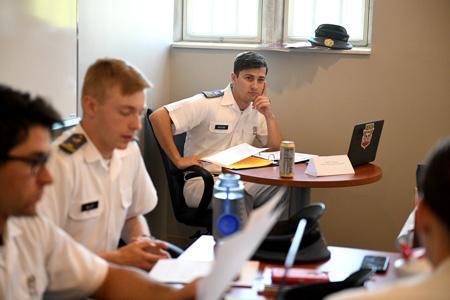Democracy Class Run Democratically

Grayson Galeone ’22 serves as moderator during a debate in, “Democracy and Elections,” a course taught by Col. Howard Sanborn. -VMI Photo by Kelly Nye.
LEXINGTON, Va., May 27, 2022—Col. Howard Sanborn, VMI professor of international studies, teaches a class called, “Democracy and Elections.” For fourteen years, he had been toying with the idea of running the class democratically, that is, letting the cadets decide the rules, reading topics and assignments. This semester, he did just that.
“Democracy and Elections” is an explanation of principles of democracy and how theory is applied on the ground in different countries. Cadets learn the meaning of democracy, how scholars define it, and how different forms are implemented. They review the processes by which democracies of one type transition into another or how authoritarian regimes morph into democratic systems. They investigate how institutions vary across countries, including the roles of the executive, legislature, and judiciary branches. Chiefly, cadets spend time reviewing how different states translate popular opinion into government action. This includes examples of majoritarian electoral systems used by the Unites States, Australia, and the United Kingdom; proportional systems used by Ireland, Brazil and Iraq; and hybrid systems, found in Taiwan, Japan, New Zealand, and Germany.
This semester, Sanborn edited his usual syllabus for the course. “It was the shortest syllabus I ever wrote,” Sanborn said. “I told the cadets there is only one rule, I remain the grader. I gave the cadets the task of ratifying a class compact, basically a rights and responsibilities document, and discussed with them the principles and challenges in doing so and guided them with the decisions and processes.”
The cadets ratified the compact, but wrestled with the work and responsibilities that come with running a democracy. They battled between looking out for the good of the community and treating everyone by the same rules versus the rights and freedoms of the individual to determine their own fate. One rule they prioritized for the class was each student having the opportunity to speak during each class. Sanborn noted, “For the three women in the class, this was reassuring that their voices would be heard.”
One of the texts used in the class was written by political scientist, Robert Dahl. Dahl wrote five criteria for democracy:
1. Equality in voting – one person, one vote.
2. Effective participation – ability to express preferences in the decision-making process.
3. Enlightened understanding - marketplace of ideas and freedom of speech and press.
4. Citizen control of the agenda – public chooses the issues they believe are most important.
5. Inclusion – citizenship open to everyone, same laws and rights apply to everybody.
The students’ structure of the class closely follows these criteria. They believed very strongly that no citizen should be disenfranchised, but they noted that with the right of participating and voting in a democracy, there is a responsibility to educate oneself and to actively participate, which many people fail or simply refuse to do.
“I must say, this class has been among the most rewarding for me to teach in my time at VMI,” stated Sanborn, “In fact, this year has been one of my favorite years to teach since I started in 2008. Perhaps, cadets released the pent-up excitement for their subjects after the upheavals of the pandemic,” he continued. “Perhaps, I got lucky with several sections of excellent cadets across my Democracy, China, and Computer Analysis courses. Whatever the reasons, I found the cadets to be interested, curious, and a pleasure to work with.”
According to Justin Miller ’23, an international studies major, the class allowed for equal responsibility. “Though Colonel Sanborn was ultimately the one who entered grades and evaluated us, the participants (or citizens, if you will) were afforded the opportunity to make their mark on discussion and the class in general. Everyone had an opportunity to serve as moderator, a large responsibility, essentially the steward of the class.”
Xavier Frederick ’23, a modern languages and cultures major, said that the class forced the cadets to think outside the box. “I feel the class really allows for us, the cadets, to act out a democratic system; formulating bills and amendments and forecasting problems with law propositions,” said Frederick.
After much class discussion and vigorous debate, several amendments were added to the compact later in the semester. Through the course, the class learned not only about democracy, but also about human nature, and gained a greater appreciation for the country’s founding fathers.
Marianne Hause
VMI Photo by Kelly Nye
Communications & Marketing
VIRGINIA MILITARY INSTITUTE
.svg)
.png)